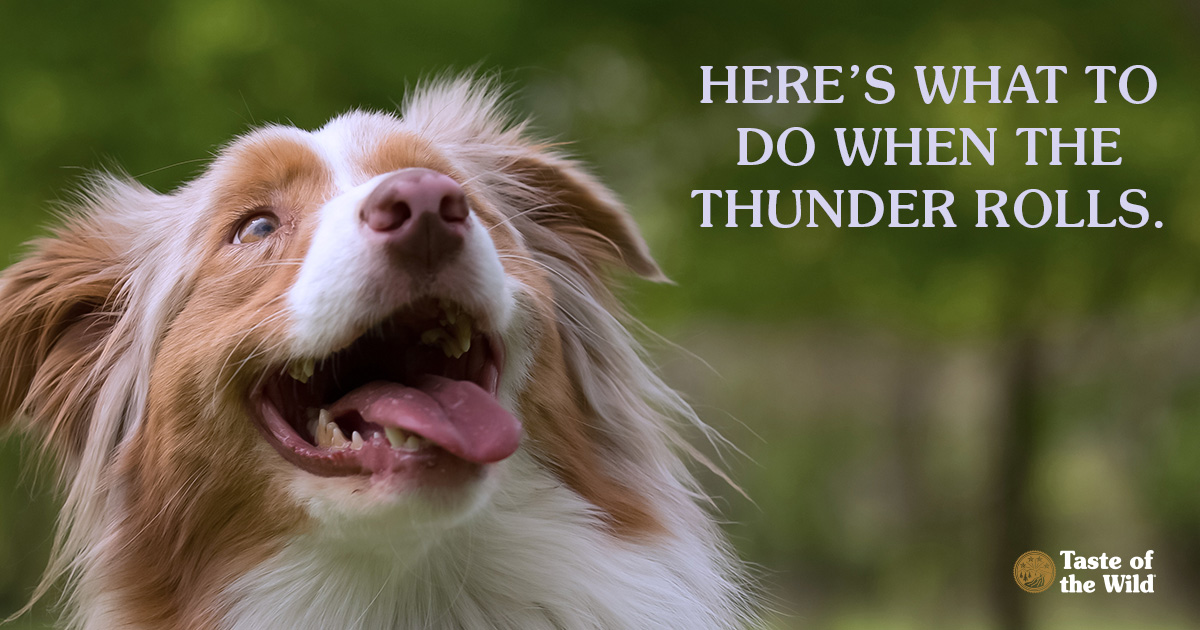
Is your dog afraid of thunder? Does the pitter-pat of rain on the roof have a less-than-calming effect on your pet?
Dogs with storm phobias, it seems, are better at predicting thunderstorms than the weather forecasters. Long before the first dark cloud rolls in, these dogs may pant and pace around the house or cling to you like Saran wrap. As the storm intensifies, phobic dogs may tremble and whimper or become destructive, scratching at doors or chewing on windows in an irrational attempt to escape the house, even to the point of injuring themselves.
Is it a storm phobia or a noise phobia?
Getting to the bottom of what, exactly, is distressing your dog can be challenging. For some pups, it may simply be a noise phobia, or an aversion to loud noises like thunder. For others, there can be multiple triggers, such as barometric pressure changes, lightning, gusts of wind blowing leaves, or even additional static in the environment.
Dogs with storm phobias don’t always have noise phobias and vice versa. About 90 percent of dogs with storm phobias are also afraid of fireworks, gunshots and other loud noises. Only 75 percent of dogs with noise phobias are also afraid of storms. To complicate matters, it’s also common for dogs with storm phobias to have separation anxiety, an exaggerated response to being left alone or being away from family members.
For dogs that become severely distressed during storms, it’s important to work with a veterinary behaviorist to determine what’s causing the problem so the right treatment can be initiated.
Helping your dog calm down
Although it may be frustrating to come home to chewed sheetrock, you should never punish a dog for reacting to storms or thunder. These pets are truly distressed, and punishment may simply add another level of fear. Instead, do what you can to help reduce your dog’s anxiety. This may include a number of strategies:
• Provide background noise such as radio, television or Through a Dog’s Ear
• Try Thundershirts, which apply gentle pressure to the dog’s body, similar to a hug, or ThunderHuts, crate covers that help mute sound (but leave the crate door open so your dog doesn’t hurt itself if it panics).
• Use dog-appeasing pheromone (DAP), available in a spray, collar or room diffuser, which may help reduce anxiety.
• Create a safe place where your dog may retreat during storms, such as a quiet closet in the middle of the house, away from the windows; set it up with a cozy bed and your dog’s favorite toys.
Behavior Modification
To treat phobias, veterinary behaviorists generally recommend combining desensitization with counter-conditioning. For dogs with a noise phobia, for example, desensitization may involve exposing the dog to low levels of the anxiety-provoking experience, such as playing a recording of thunder at an almost imperceptible level.
At the same time, pair the recording with something positive, like your dog’s favorite treat or a game of tug-of-war. This counter-conditioning strategy pairs a positive experience with the previously negative one. Over time, you can gradually increase the volume of the recording to desensitize the dog to the sound of thunder.
Of course, this is easier to do for dogs with a single trigger, such as noise, because it’s almost impossible to re-create every aspect of a storm such as changes in barometric pressure. In any case, it’s best to start the training months before thunderstorm season, if possible.
Medications to reduce anxiety
In severe cases, your veterinarian may recommend medications. For days when you know thunderstorms are expected, a fast-acting medication, given an hour or so before the storm, may help reduce stress. Dogs with multiple triggers may also need a slow-acting, daily medication, especially if you can’t be home before every storm.
Not all cases of storm or noise phobia can be completely cured, but with patience and the help of a veterinary behaviorist, you can help your dog weather the storms with less anxiety.
The information in this blog has been developed with our veterinarian and is designed to help educate pet parents. If you have questions or concerns about your pet's health or nutrition, please talk with your veterinarian.
